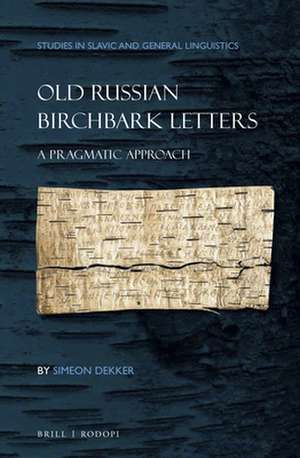Old Russian Birchbark Letters: A Pragmatic Approach: Studies in Slavic and General Linguistics, cartea 42
Autor Simeon Dekkeren Limba Engleză Hardback – 21 feb 2018
Preț: 546.39 lei
Preț vechi: 666.33 lei
-18% Nou
Puncte Express: 820
Preț estimativ în valută:
104.57€ • 108.88$ • 88.37£
104.57€ • 108.88$ • 88.37£
Carte indisponibilă temporar
Doresc să fiu notificat când acest titlu va fi disponibil:
Se trimite...
Preluare comenzi: 021 569.72.76
Specificații
ISBN-13: 9789004362383
ISBN-10: 900436238X
Pagini: 184
Dimensiuni: 155 x 235 mm
Greutate: 0.48 kg
Editura: Brill
Colecția Brill
Seria Studies in Slavic and General Linguistics
ISBN-10: 900436238X
Pagini: 184
Dimensiuni: 155 x 235 mm
Greutate: 0.48 kg
Editura: Brill
Colecția Brill
Seria Studies in Slavic and General Linguistics
Cuprins
PrefaceList of AbbreviationsList of TablesList of FiguresIndex of Birchbark Letters1 The Field of Study: Berestology1.1Introduction1.2Excavations1.3Dating and Chronology1.4Users and Uses of the Birchbark Letters1.5The Language: Old Novgorodian1.6Other Sources: Parchment Documents1.7Concluding Remarks2 The Background: Communicatively Heterogeneous Letters2.1Introduction2.2The Problem2.3Communicative Heterogeneity2.4The Oral Component2.5Evaluating Gippius (2004)2.6Subsequent Research2.7Discussion3 Research Question3.1Introduction3.2Research Question3.3The Choice of Case Studies3.4Concluding Remarks4 Theory and Methodology4.1Introduction4.2Philology4.3Pragmatics4.4Pragmaphilology4.5Orality4.6Use of the Corpus4.7Illustration of the Pragmaphilological Approach: One Case Study5 Case Study I: Imperative Subjects5.1Introduction5.2Imperative Subjects5.3The Imperative Subject as a Cohesive Device5.4The Oral Component5.5Concluding Remarks6 Case Study II: Speech Reporting6.1Introduction6.2Speech Reporting Strategies6.3Some Terminological Considerations6.4The Data on Birchbark6.5Diachronic Considerations6.6Speech Reporting Strategies on a Scale6.7Complexity and Context6.8Functional Considerations6.9Free Direct Speech Revisited6.10More Elements of Orality: Dictation and Performatives Type6.11Concluding Remarks7 Case Study III: Epistolary Past Tense7.1Introduction7.2Birchbark Data and Discussion7.3Epistolary Past Tense in Other Languages7.4The Data on Birchbark Revisited7.5Deixis7.6Performatives7.7Ancient Greek Revisited7.8Concluding Remarks8 Case Study IV: Assertive Declarations8.1Introduction8.2Theoretical Considerations8.3The Data on Birchbark8.4Other Languages8.5Discussion8.6Concluding Remarks9 Conclusions9.1Introduction9.2General Lines Connecting the Case Studies9.3A Transitional Period of Verschriftlichung9.4Final RemarksReferencesIndex
Notă biografică
Simeon Dekker, Ph.D. (Leiden University, 2016) is a researcher in Slavic philology. His main focus of research concerns the pragmatics of medieval texts.
Recenzii
"Dekkerʼs book is a very welcome contribution to the field of historical pragmatics and an important step towards a comprehensive account of the pragmatics of the Old Russian birchbark letters."
-Imke Mendoza, Paris-Lodron-Universität Salzburg in Journal of Historical Sociolinguistics, 2019
-Imke Mendoza, Paris-Lodron-Universität Salzburg in Journal of Historical Sociolinguistics, 2019











